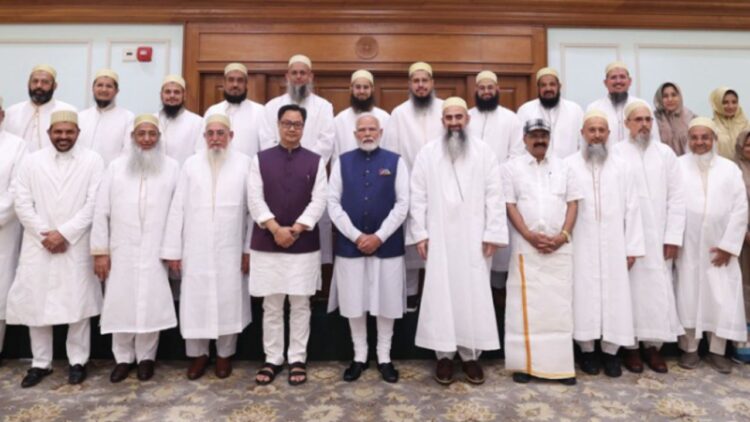Prime Minister Narendra Modi on Thursday lauded the Dawoodi Bohra community for their exceptional and detailed involvement in shaping the Waqf (Amendment) Act, 2025, emphasizing that their contribution extended “even down to commas and full stops.”
Addressing a delegation from the community, PM Modi highlighted the critical role played by Syedna Mufaddal Saifuddin, the spiritual head of the Dawoodi Bohras, in initiating and supporting the reform process.
“Perhaps very few of you know that when I first got the idea of working on the Waqf (Amendment) Act, the first person I consulted was Syedna Sahib,” the Prime Minister said. He recounted how Syedna Saheb smiled upon hearing his intent and later sent community members to assist with the process.
Modi noted that this collaboration spanned three years, during which he repeatedly sought Syedna Saheb’s insights, legal guidance, and feedback on the draft.
“You cannot imagine how much support he gave me during the consultation,” the Prime Minister said. “He brought in knowledgeable people from your community. Even down to commas and full stops — I received help at every step.”
PM Modi underlined that this wasn’t a sudden connection, but part of a long-standing relationship with the Dawoodi Bohra leadership. He recalled an earlier discussion on the Waqf issue with Syedna Mohammed Burhanuddin, Syedna Mufaddal Saifuddin’s grandfather, who lived to be around 99 or 100 years old.
“You might remember, when your grandfather, Syedna Saheb, once came to my home — we started talking about the Waqf issue even back then,” Modi said, underlining the continuity in the community’s involvement and concern.
The Prime Minister also addressed the problem of encroachments on sacred Waqf lands, a matter of deep concern for the community. He emphasized the need to empower honest caretakers of these properties.
“If there is anyone who can present the best model of how the spirit of Waqf should work, and for whom it should be done, it’s Saheb Sahena,” he said, referring with deep respect to the Bohra leadership.
He further revealed that one of the driving forces behind the Waqf reform was the large number of complaints received after the 2019 Lok Sabha elections.
“After my 2019 victory, there were over 1,700 complaints from the Muslim community. Most of these were from women and daughters seeking justice. That’s when I truly understood the reality on the ground,” he said.
According to PM Modi, the government then spent five years studying the issue in depth and consulting religious leaders across various sects, including Shia Muslims.
“Whether it’s the larger Muslim society or the Shia Muslims, all of them face challenges with the Waqf board and Hadiya,” he explained, referring to the broader systemic problems.
He emphasized that the objective of the amendment was to ensure justice for the poorest and most vulnerable sections of the community.
“When the prayers of the poorest people come to you, their power multiplies many times. Our job is to give authority and system control to such honest people — and that’s the fight we’re fighting,” Modi added.
The Prime Minister concluded his address by thanking the Bohra community for their consistent support and expressed happiness at meeting them again.
About the Waqf (Amendment) Act, 2025
The Waqf (Amendment) Bill, 2025, was passed to strengthen the management of Waqf properties across India. Key objectives of the Act include:
- Empowering honest managers of Waqf properties.
- Improving processes for survey, registration, and disposal of legal cases.
- Promoting modern and scientific methods for the development of Waqf properties.
- The Act also repeals the Mussalman Wakf Act of 1923, which had long been outdated.
The Bill, initially introduced in August 2024, was revised based on recommendations by a Joint Parliamentary Committee, reflecting inputs from various stakeholders, including religious leaders.
It amends the original Waqf Act of 1995 and brings about substantial changes, such as:
- A more efficient registration system for Waqf properties.
- Greater use of technology to modernize the functioning of Waqf Boards.
- Mechanisms to reduce corruption and ensure transparency and accountability in Waqf administration.
The reform aims to correct long standing shortcomings in the earlier law and to enable Waqf Boards to function in a streamlined, efficient, and just manner.

















Comments